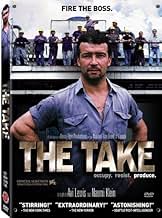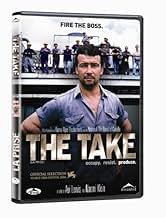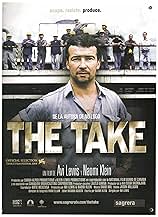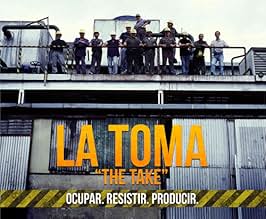ÉVALUATION IMDb
7,6/10
1,2 k
MA NOTE
Ajouter une intrigue dans votre langueIn the wake of Argentina's economics collapse of 2001, factory workers break into abandoned factories and restart production. Could these pioneers of cooperative ownership be a model for reb... Tout lireIn the wake of Argentina's economics collapse of 2001, factory workers break into abandoned factories and restart production. Could these pioneers of cooperative ownership be a model for rebuilding Argentina's economy?In the wake of Argentina's economics collapse of 2001, factory workers break into abandoned factories and restart production. Could these pioneers of cooperative ownership be a model for rebuilding Argentina's economy?
- Prix
- 1 victoire et 5 nominations au total
Bill Clinton
- Self
- (archive footage)
Gustavo Cordera
- Self (singer)
- (as Bersuit)
Carlos Saúl Menem
- Self
- (as Carlos Menem)
Juan Domingo Perón
- Self
- (archive footage)
Avis en vedette
This movie helps progressive people address one of the main criticisms of the right and capitalists: what would you do differently if capitalism and globalization is so bad?
Argentina was a country where public utilities had been sold off and money fled the country. Factories were left empty, owing millions of dollars in taxes to various levels of government. The workers thought: we don't have jobs, so we can't buy things for our families. There are no jobs, because people aren't buying things for their families. So they broke the cycle, and with government approval (eventually) occupied the factories and just started producing items for themselves and their neighbors. The co-operative/collectivist movement in Argentina flourished.
The movie shows it was far from easy, and there are many hurdles left to overcome for this country and its people. But it's a hopeful message that if you buy locally, use locally produced services and products produced "locally", you create a viable economic cycle that enriches everybody. You may not have $40 microwaves produced someplace else on the other side of the world, but instead you get a quality product produced by your neighbour, that doesn't require the expense and waste of trans-global shipment. Then, the makers of cheap microwaves will be forced to pay their workers more in order to create a local/national market for their products, rather than using slave labour and shipping the products overseas to the "first world".
Okay, I'm off my soap box. Well done movie with real emotion and appeal.
Argentina was a country where public utilities had been sold off and money fled the country. Factories were left empty, owing millions of dollars in taxes to various levels of government. The workers thought: we don't have jobs, so we can't buy things for our families. There are no jobs, because people aren't buying things for their families. So they broke the cycle, and with government approval (eventually) occupied the factories and just started producing items for themselves and their neighbors. The co-operative/collectivist movement in Argentina flourished.
The movie shows it was far from easy, and there are many hurdles left to overcome for this country and its people. But it's a hopeful message that if you buy locally, use locally produced services and products produced "locally", you create a viable economic cycle that enriches everybody. You may not have $40 microwaves produced someplace else on the other side of the world, but instead you get a quality product produced by your neighbour, that doesn't require the expense and waste of trans-global shipment. Then, the makers of cheap microwaves will be forced to pay their workers more in order to create a local/national market for their products, rather than using slave labour and shipping the products overseas to the "first world".
Okay, I'm off my soap box. Well done movie with real emotion and appeal.
10protek22
The Take is one of the most informative economic and political documentaries currently available. The issues Ms. Klein and her colleagues chronicle, are of extreme importance for anyone seeking to gain a factual understanding of today's most pressing economic and political issues. Argentina had been a poster child for the globalization and neoliberal economic policies promoted by the U.S., the World Bank, and the IMF. While these policies are still being widely hailed by the mainstream media as the wave of the future, their truly destructive nature is actually understood by very few. This film allows the viewer to witness the catastrophic economic and political challenges that brought Argentina to it's knees, and the inspired solution implemented by Argentinian workers, as they rallied from the depths of economic and political despair, to redeem themselves from the clutches of corrupt politicians, and global financiers.
This documentary is the real "Yes, We Can", only instead of an empty political statement it's a true demonstration of "How You Can" make a real change.
When someone tells you that an enterprise cannot run without a boss and a hierarchy of power, don't believe them. Just let them watch "The Take" (La Toma) and see how it's possible to replace the "hierarchy of power" with a "network of cooperation". At first, I didn't believe it myself, but now I know it's possible. Imagine workers cooperating and taking decisions by voting, effectively managing a successful enterprise. Even if the people are inexperienced at first, even if they disagree sometimes, things can be worked out.
"The Take" simply shows something that Capitalism says cannot exist, something that's supposedly impossible: people cooperating for a common purpose, dividing profits equally, taking decisions democratically and managing the enterprise successfully. No leaders, no power struggles, just cooperation. The incentive is the common success, not just personal gain.
"The Take" is even more topical today in the so-called Global financial crisis, because it poses the question: "what should happen to a failed business? Should it be bailed out by the people only to repeat the same mistakes again? Should it be liquidated and sold for scrap metal, leaving the workers without jobs? Or should everything start anew, but this time as a democratic cooperation between workers?" So next time a business fails and the government decides to take your money to save a corporation, know that you have the right to say "NO, I deserve to be compensated. Your factory will do nicely."
I simply cannot express how inspiring and eye-opening this documentary is, you just have to see it for yourself.
When someone tells you that an enterprise cannot run without a boss and a hierarchy of power, don't believe them. Just let them watch "The Take" (La Toma) and see how it's possible to replace the "hierarchy of power" with a "network of cooperation". At first, I didn't believe it myself, but now I know it's possible. Imagine workers cooperating and taking decisions by voting, effectively managing a successful enterprise. Even if the people are inexperienced at first, even if they disagree sometimes, things can be worked out.
"The Take" simply shows something that Capitalism says cannot exist, something that's supposedly impossible: people cooperating for a common purpose, dividing profits equally, taking decisions democratically and managing the enterprise successfully. No leaders, no power struggles, just cooperation. The incentive is the common success, not just personal gain.
"The Take" is even more topical today in the so-called Global financial crisis, because it poses the question: "what should happen to a failed business? Should it be bailed out by the people only to repeat the same mistakes again? Should it be liquidated and sold for scrap metal, leaving the workers without jobs? Or should everything start anew, but this time as a democratic cooperation between workers?" So next time a business fails and the government decides to take your money to save a corporation, know that you have the right to say "NO, I deserve to be compensated. Your factory will do nicely."
I simply cannot express how inspiring and eye-opening this documentary is, you just have to see it for yourself.
I saw this on television (CBC) yesterday night and thought it was a good documentary. I had heard of the film and its topic before and was deeply intrigued. Having also read Klein's "No Logo", you could say I had more interest in this than most. Lewis and Klein move swiftly in telling their tale of Argentinian workers' plight for dignity and labour. A balanced interplay of rhetoric that appeals to the intellect and the emotions will win over many of the viewers. The length is such that the film does not become boring or drawn-out and good editing judgment focuses on relevant segments. Regardless of their take on these events in Argentina, I think everyone has something to learn from this film. A project like this gives me faith in our country's National Film Board ... also thanks to CBC Newsworld for not fearing to air this several times (even though late at night).
the worker owned factories in argentina are one of the best developments in recent history. i think the most interesting part of it is that people who are not ostensibly "political" have responded to a crisis by instituting something, spontaneously, that looks like it is within spitting distance of anarchosyndicalism. joe hill would be proud.
i saw this film as part of the touring show for the lost film festival, and it was easily the highlight of the show. I'm eagerly awaiting this to come to a local theater so i can see it again, and i'm going to try to get as many people as possible to go.
i saw this film as part of the touring show for the lost film festival, and it was easily the highlight of the show. I'm eagerly awaiting this to come to a local theater so i can see it again, and i'm going to try to get as many people as possible to go.
Meilleurs choix
Connectez-vous pour évaluer et surveiller les recommandations personnalisées
Détails
- Date de sortie
- Pays d’origine
- Sites officiels
- Langues
- Aussi connu sous le nom de
- Захват
- Lieux de tournage
- sociétés de production
- Consultez plus de crédits d'entreprise sur IMDbPro
Box-office
- Brut – États-Unis et Canada
- 30 380 $ US
- Fin de semaine d'ouverture – États-Unis et Canada
- 8 625 $ US
- 26 sept. 2004
- Brut – à l'échelle mondiale
- 30 380 $ US
- Durée
- 1h 27m(87 min)
- Couleur
Contribuer à cette page
Suggérer une modification ou ajouter du contenu manquant


















